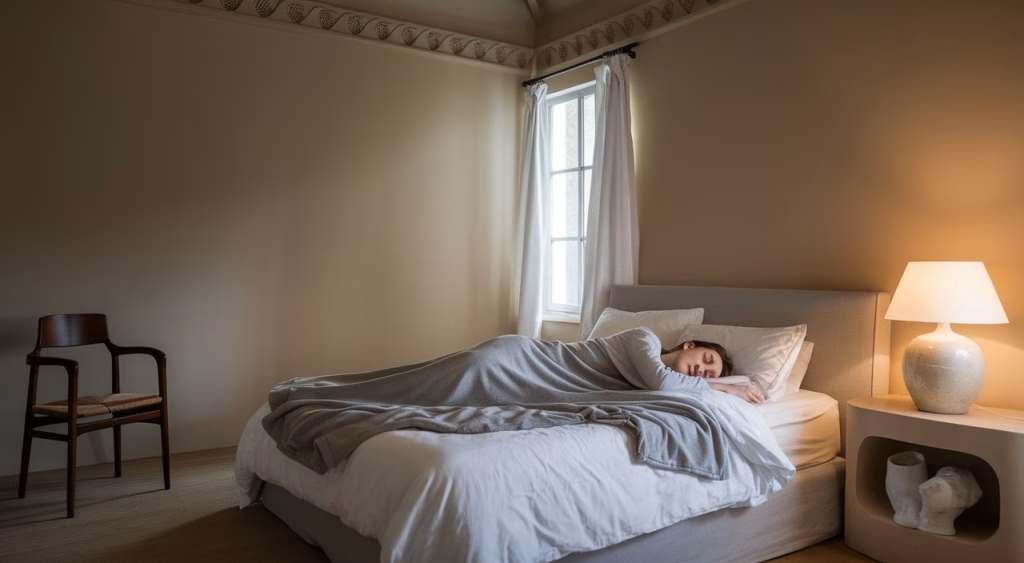Why Does Snoring Increase With Age?
Snoring increases with age—but why? This common concern among adults, particularly those in middle age and beyond, isn’t just frustrating. It’s often a sign that subtle changes in your body are making restful nights harder to maintain. Understanding what’s really happening can empower you to take specific actions for quieter, deeper sleep.
TL;DR: Summary of What You’ll Learn
- Yes, snoring increases with age: Muscle relaxation, weight gain, and anatomical shifts all play a role.
- It’s not just noisy—it can be harmful: Snoring disrupts sleep quality and may be linked to sleep apnea.
- You can reduce snoring naturally: Through positioning, breathing techniques, and diet changes.
- Lifestyle changes matter: Weight loss, sleep posture adjustments, and nasal hygiene can greatly help prevent snoring in older adults.
- Medical help is available: If your snoring is chronic, professionals have proven solutions.
The Science Behind Why Snoring Increases with Age
Ever wondered why some people never had issues in their youth but now snore every night? The truth is, as we age, our muscles—including those in the throat and soft palate—naturally become less toned. During sleep, this leads to airway collapse or narrowing, resulting in that familiar snoring sound that affects so many older adults.
When you snore, it’s caused by turbulent airflow that makes the relaxed tissues in your throat vibrate. For older adults, the combination of muscle relaxation, gravity, and sometimes increased weight creates the perfect storm for nighttime snoring. Let’s break this down further:
- Throat muscle laxity: After middle age, muscle tone diminishes, which weakens the airway structure and makes you more likely to snore.
- Nasal passage changes: The nasal tissues may swell more easily with age, especially if allergies or sinus issues are present.
- Weight gain: Fat deposits around the neck and throat constrict the airway, especially when lying down, leading to increased snoring.
How Snoring Impacts Your Health as You Age
While occasional snoring might not be a problem, regular snoring—especially if it’s loud or accompanied by gasping—can have real health consequences. Here’s what we know about the connection between snoring and health in older adults:
Sleep Disruption
Snoring doesn’t only wake up your partner. Even if you don’t realize it, when you snore regularly, it can disrupt your sleep architecture, decreasing time spent in deep, restorative stages of sleep. Poor quality sleep leads to daytime fatigue, irritability, and trouble focusing—issues that become more problematic as we age.
Signs of Sleep Apnea
Loud snoring with pauses in breathing may signify obstructive sleep apnea (OSA), a serious condition that’s more common with increased age and weight. If you’re waking up frequently, gasping for air, or have high blood pressure, it’s time to talk to a doctor about your snoring patterns.
Cardiometabolic Risks
Chronic snoring and sleep apnea are linked to an increased risk of high blood pressure, stroke, Type 2 diabetes, and even cardiac arrhythmias. Your snoring might be more than annoying—it could be a health red flag that needs attention.
Proven Tips to Reduce Snoring in Middle Age and Beyond
Think quiet sleep isn’t realistic as you get older? Think again. With a few strategic changes, you can snore less and sleep better, regardless of your age:
- Change your sleep position: Back-sleeping worsens snoring. Try side-sleeping with a supportive pillow or body cushion to keep airways open.
- Lose weight if needed: Even modest weight loss reduces fatty tissue in the neck and opens the airway, helping prevent snoring in older adults.
- Prepare your airway before bed: Clear nasal passages with a warm shower, saline rinse, or humidifier in dry environments to reduce the likelihood you’ll snore.
- Limit alcohol and sedatives at night: These overly relax throat muscles and make snoring significantly worse.
- Elevate your head: Raising your head with a wedge pillow or adjustable bed base can help reduce throat collapse and minimize snoring.
Natural Remedies for Quieter Nights
For those looking for a holistic or non-invasive approach, natural remedies for snoring can make a genuine difference—especially for those in middle age wanting to reduce or prevent snoring without medication or surgery.
Breathing Exercises
Simple daily practices like “tongue slides” and nasal breathing drills can strengthen airway muscles. Regular practice trains the throat to resist collapse during sleep, naturally helping you snore less.
Herbal Solutions
Herbs like peppermint, eucalyptus, and turmeric have anti-inflammatory properties that support open breathing. These natural remedies for snoring, whether used as inhalation, tea, or topical oil-based formulations, can be effective when used consistently.
Diet Adjustments
Spicy or dairy-heavy dishes at dinner can promote nasal and mucous congestion in some individuals. Light, anti-inflammatory meals in the evening may reduce blockages that encourage snoring, helping you achieve quieter sleep.
Yoga and Meditation
Stress makes everything worse—from sleep quality to breathing patterns. Yoga, deep breathing, or evening meditation often quiet the body before sleep, reducing tension-related snoring and promoting overall better rest.
Cost Guide: Addressing Snoring by Budget
| Solution | Low-End | Mid-Range | High-End |
|---|---|---|---|
| Lifestyle Tools (pillows, humidifiers) | $10–$40 | $50–$100 | $150–$300 |
| Natural Remedies & Supplements | $5–$20 | $20–$60 | $75–$120 |
| Professional Diagnosis (sleep study) | $100–$300 (home) | $500–$1,000 | $1,500+ |
| CPAP/Special Devices | $250–$400 | $500–$1,200 | $1,500+ |
When to Seek Professional Help for Chronic Snoring
If none of the above remedies are reducing your snoring—or you feel unrested each morning—it’s time to talk to a professional. Chronic snoring might signal obstructive sleep apnea, which not only affects your sleep but your heart, metabolism, and brain function, especially as you age.
Here’s what typically happens when you seek help for persistent snoring:
- Assessment: A detailed questionnaire, sleep history, and possible home or lab-based sleep study to understand your snoring patterns.
- Objective readings: Oxygen saturation, choking events, and sleep duration are tracked to determine severity.
- Personalized plan: Depending on severity, treatments may include CPAP therapy, dental appliances, positional therapy, or airway surgery—often just minimally invasive procedures.
Don’t wait too long to address chronic snoring. If snoring is impacting your life or raising health concerns, reach out to a qualified sleep specialist or ENT. You’re not meant to snore forever—and there is effective help available.
Final Thoughts: Achieving Quiet Sleep at Any Age
While snoring increases with age for many of us, it doesn’t have to become a permanent part of life. Whether you’re a middle-aged adult noticing new nightly sounds or an older individual struggling with regular awakenings, quiet sleep is achievable. Through lifestyle changes, natural remedies for snoring, and—when needed—expert clinical guidance, we can help you silence the snore and transform your nights into truly restorative rest.
Frequently Asked Questions
- Why do I snore more as I get older?
- Aging causes the muscles in your throat to relax more during sleep, narrowing the airway and increasing vibration that causes snoring.
- Can snoring be cured naturally?
- Yes, some people find lasting results through weight loss, breathing exercises, sleep position changes, and anti-inflammatory remedies like eucalyptus and turmeric.
- Is snoring dangerous?
- Occasional snoring is common, but chronic or loud snoring can be a sign of obstructive sleep apnea, which is linked to serious health risks and should be treated.
- Do I need a sleep study?
- If your snoring is persistent, loud, or you wake gasping—or if your partner notices breathing pauses—a sleep study is recommended to rule out sleep apnea.
- Does side sleeping help reduce snoring?
- Absolutely. Side sleeping helps keep your airway open and reduces the chances of throat tissue collapsing, a major contributor to snoring.
- What foods make snoring worse?
- Dairy, spicy foods, and heavy evening meals may increase mucus production and inflammation, leading to worsened snoring for some individuals.
- When should I seek medical help for my snoring?
- If lifestyle adjustments don’t help—or if snoring affects your energy, mood, or cardiovascular health—it’s time to consult a specialist.





